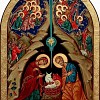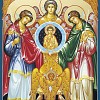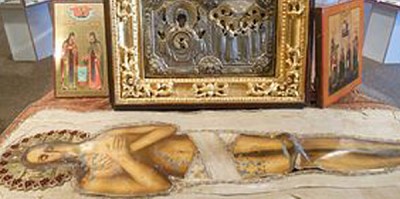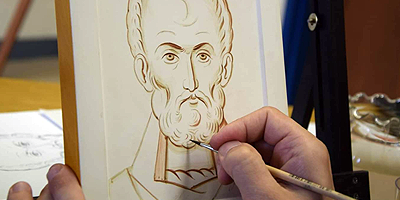Excerpt from a past article by Bishop-Elect Alexis (Trader)
In the plethora of human experiences, grief is perhaps the most universal and most likely the most difficult with which to cope. The very nature of grief demands that the event that precipitated the grief become meaningful. Yet how can the loss of a person that held together one’s inner world possibly become meaningful? How can a meaningless loss ever become a meaningful gain? Somehow, one needs to find a thread of meaning that can allow one to be grateful for the past, to accept the present, and have hope for the future, but where can that golden thread be found?
The early church fathers and contemporary spiritual fathers have grasped the importance of meaning attachment concerning grief. In a letter to one of his spiritual children, Elder Anthony of Optina writes, “With my whole heart I sympathize with you over your beloved sister’s acute and prolonged illness. I am entreating the Lord God for her, that He might renew her feeble strength to nobly bear her sufferings (because impatience will bring her no relief), and that He might lighten them. From her acute illness she may conclude that the Lord God loves her as His bride more than all your sisters. When she nobly bears her sufferings, then the Lord God abides with her invisibly as He said by the mouth of Saint David … (Elder Anthony of Optina, by Fr. Clement Sederholm, p. 222)
The Elder Anthony shows one way a Christian can assign meaning to suffering. One looks not simply at what is seen with the eyes of the body, but at what can be perceived with the eyes of the spirit. One beholds the presence of Christ and the beauty of the soul, and suddenly the entire picture changes. Where there was darkness, now there is light, and love, and peace. For a Christian who interprets the world in this way, grief becomes a sign of predilection, not a curse. It is an indication that the grieved is being invited to a more intimate communion with the Lord God. This kind of meaning assignment is precisely how the holy martyrs were able to thank God for their sufferings even in the face of cruel tortures and remain joyfully radiant. And what is truly wonderful is that our lives can become as extraordinary as that of the martyrs when like them we look to Christ’s countenance even when we suffer most, even when we appear to have lost everything. Finding this kind of meaning is what Saint Paul was speaking about when he wrote to the Corinthians: By honour and dishonour, by evil report and good report: as deceivers, and yet true; As unknown, and yet well known; as dying, and, behold, we live; as chastened, and not killed; As sorrowful, yet alway rejoicing; as poor, yet making many rich; as having nothing, and yet possessing all things (2 Corinthians 6:8-10).
Ultimately, physical illnesses or the death of a loved one are opportunities to reflect upon the brevity of earthly life and ponder the reality that we are sojourners in a foreign land with our real homeland being in heaven with Christ and His saints. In another letter to a different spiritual child, Elder Anthony writes, “Your greatly ailing and comfortless state of health causes my heart to grieve with you. Because of my duty of love and compassion, I have prayed for you daily and entreat the Lord God that He grant you Christian patience in your illness, and alleviation. But if your illness continues to the present time, this is not because God has not heard the prayers that have been offered to Him, but because He leaves certain ones without healing so as to more readily benefit the sufferer. Through temporal suffering a sinful man not only is freed from eternal torments for his sins, but is also granted salvation and made an heir of the Heavenly Kingdom” (Elder Anthony of Optina, p. 225).
The Elder’s words are not to be construed as God’s punishment, but rather God allowing grief and suffering in order to awaken the heart to another reality that is far more precious than our earthly life. In his letter to the Colossians, Saint Paul exhorts his listeners in a similar vein, If ye then be risen with Christ, seek those things which are above, where Christ sitteth on the right hand of God (Colossians 3:1) Each of us who have been baptized into Christ have been baptized into His death and Resurrection. In moments of grief during our earthly sojourn, we can ultimately find meaning by clinging to Him Who has already conquered death and given us life. In that “newness of life,” we can not only find meaning, but also behold a new heaven and a new earth when our first heaven and first earth have passed away (Revelations 21:1).
- Excerpt from a 2015 Article by Bishop-elect Alexis (Trader) in orthochristian.com
|
| |||||||||||||
175 St. Tikhon's Road
Waymart, PA 18472
Thu
2MayHoly Thursday
8:00 Hour and Liturgy of St. Basil
6:00 12 Passion GospelsFri
3MayHoly Friday
8:00 Royal Hours
3:00 Vespers with placing of Plashnitsa
7:00 Matins for Holy SaturdaySat
4MayHoly Saturday
7:40 Hours and St. Basils Liturgy
11:30 Midnight Office
12:00 Matins and Paschal Liturgy











